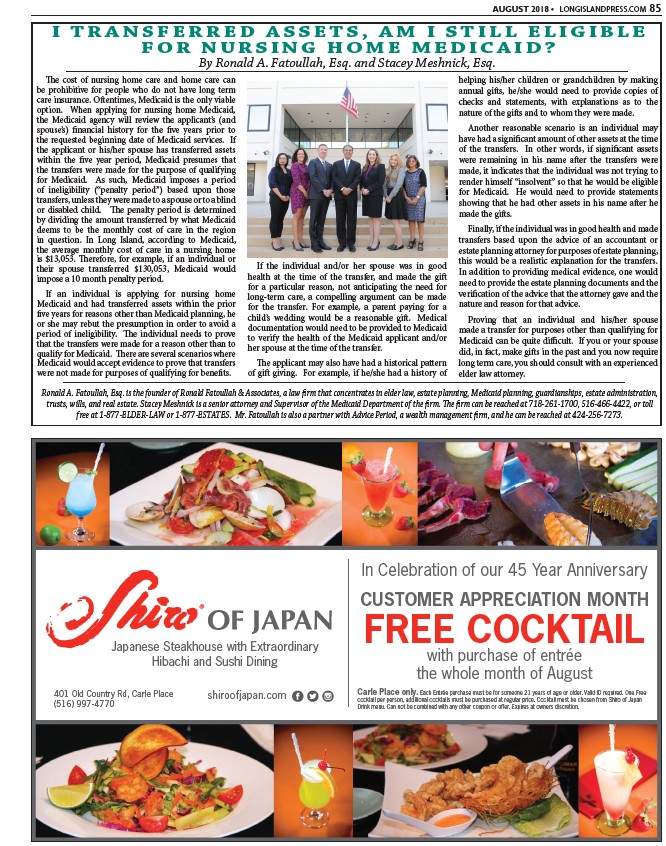
AUGUST 2018 • LONGISLANDPRESS.COM 85
I TRANSFERRED ASSETS, AM I STILL ELIGIBLE
FOR NURSING HOME MEDICAID?
By Ronald A. Fatoullah, Esq. and Stacey Meshnick, Esq.
The cost of nursing home care and home care can
be prohibitive for people who do not have long term
care insurance. Oftentimes, Medicaid is the only viable
option. When applying for nursing home Medicaid,
the Medicaid agency will review the applicant’s (and
spouse’s) financial history for the five years prior to
the requested beginning date of Medicaid services. If
the applicant or his/her spouse has transferred assets
within the five year period, Medicaid presumes that
the transfers were made for the purpose of qualifying
for Medicaid. As such, Medicaid imposes a period
of ineligibility (“penalty period”) based upon those
transfers, unless they were made to a spouse or to a blind
or disabled child. The penalty period is determined
by dividing the amount transferred by what Medicaid
deems to be the monthly cost of care in the region
in question. In Long Island, according to Medicaid,
the average monthly cost of care in a nursing home
is $13,053. Therefore, for example, if an individual or
their spouse transferred $130,053, Medicaid would
impose a 10 month penalty period.
If an individual is applying for nursing home
Medicaid and had transferred assets within the prior
five years for reasons other than Medicaid planning, he
or she may rebut the presumption in order to avoid a
period of ineligibility. The individual needs to prove
that the transfers were made for a reason other than to
qualify for Medicaid. There are several scenarios where
Medicaid would accept evidence to prove that transfers
were not made for purposes of qualifying for benefits.
If the individual and/or her spouse was in good
health at the time of the transfer, and made the gift
for a particular reason, not anticipating the need for
long-term care, a compelling argument can be made
for the transfer. For example, a parent paying for a
child’s wedding would be a reasonable gift. Medical
documentation would need to be provided to Medicaid
to verify the health of the Medicaid applicant and/or
her spouse at the time of the transfer.
The applicant may also have had a historical pattern
of gift giving. For example, if he/she had a history of
helping his/her children or grandchildren by making
annual gifts, he/she would need to provide copies of
checks and statements, with explanations as to the
nature of the gifts and to whom they were made.
Another reasonable scenario is an individual may
have had a significant amount of other assets at the time
of the transfers. In other words, if significant assets
were remaining in his name after the transfers were
made, it indicates that the individual was not trying to
render himself “insolvent” so that he would be eligible
for Medicaid. He would need to provide statements
showing that he had other assets in his name after he
made the gifts.
Finally, if the individual was in good health and made
transfers based upon the advice of an accountant or
estate planning attorney for purposes of estate planning,
this would be a realistic explanation for the transfers.
In addition to providing medical evidence, one would
need to provide the estate planning documents and the
verification of the advice that the attorney gave and the
nature and reason for that advice.
Proving that an individual and his/her spouse
made a transfer for purposes other than qualifying for
Medicaid can be quite difficult. If you or your spouse
did, in fact, make gifts in the past and you now require
long term care, you should consult with an experienced
elder law attorney.
Ronald A. Fatoullah, Esq. is the founder of Ronald Fatoullah & Associates, a law firm that concentrates in elder law, estate planning, Medicaid planning, guardianships, estate administration,
trusts, wills, and real estate. Stacey Meshnick is a senior attorney and Supervisor of the Medicaid Department of the firm. The firm can be reached at 718-261-1700, 516-466-4422, or toll
free at 1-877-ELDER-LAW or 1-877-ESTATES. Mr. Fatoullah is also a partner with Advice Period, a wealth management firm, and he can be reached at 424-256-7273.
Japanese Steakhouse with Extraordinary
Hibachi and Sushi Dining
In Celebration of our 45 Year Anniversary
CUSTOMER APPRECIATION MONTH
FREE COCKTAIL
with purchase of entrée
the whole month of August
Carle Place only. Each Entrée purchase must be for someone 21 years of age or older. Valid ID required. One Free
cocktail per person, additional cocktails must be purchased at regular price. Cocktail must be chosen from Shiro of Japan
Drink menu. Can not be combined with any other coupon or offer. Expires at owners discretion.
401 Old Country Rd, Carle Place
(516) 997-4770
shiroofjapan.com